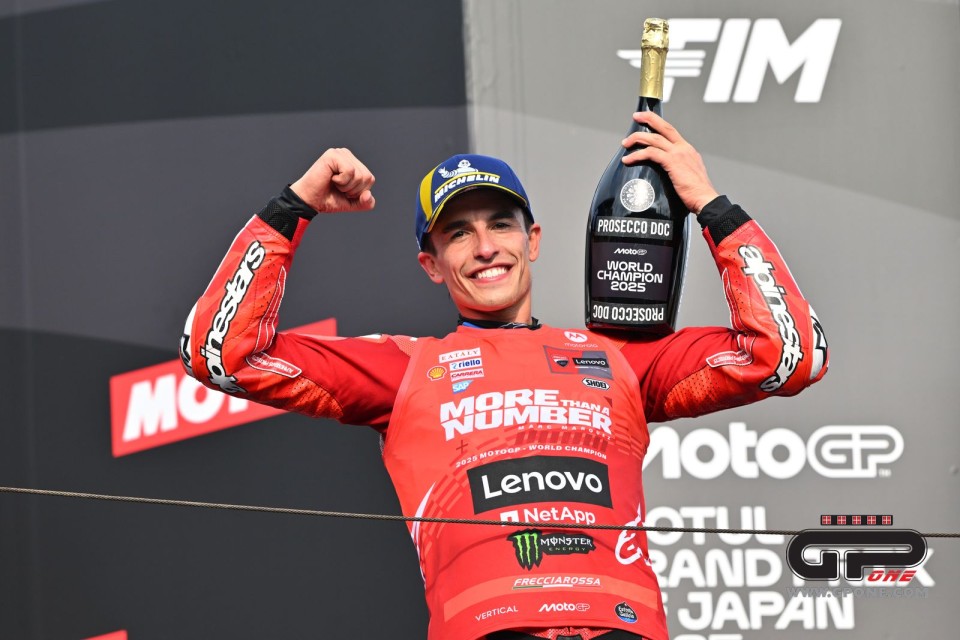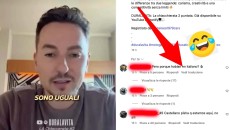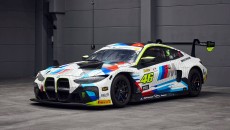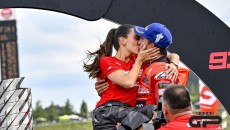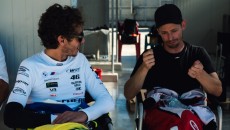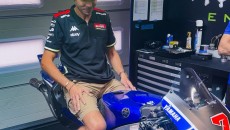After Marc Márquez's 7th MotoGP title win, the Spanish rider was showered with superlatives. Statistics were cited, his astonishing performance with a total of nind World Championship title wins in sixteen seasons was praised, his courageous switch from Honda to Ducati, his return to his former self, his World Championship points record, his impressive winning streak with Ducati Lenovo in 2025, his still indescribable will to win, his willingness to take risks, his brainpower, his racing instinct, his unparalleled bike control, and much more.
And, of course, the TV commentators and reporters searched for athletes who had achieved comparable comebacks after serious injuries. Austrian skier Hermann "Herminator" Maier - who almost had to have his leg amputated after a motorcycle accident - was an obvious choice; or popular US cyclist Greg Lemond, who was critically shot in a hunting accident and then went on to win the Tour de France. Then there was Niki Lauda, who - after his fiery fire accident at the Nürburgring on August 1st, 1976 - got back into his Ferrari in Monza just a few weeks later. And let us not forget Lance Armstrong who was cured of testicular cancer and, subsequently, clinched seven Tour de France victories.
Marc Márquez had a serious fall on July 20th, 2020 during the first event of the MotoGP World Championship in Jerez, which had been delayed due to the COVID-19 pandemic. Marc had already raced once, chasing the Yamaha armada for a podium finish, fervently cheered on by his Honda pit crew. But he then ended up falling and suffered a severe, compound fracture of his right upper arm. He, however, returned to the MotoGP practice session four days after surgery for the Andalusian GP, which was also held in Jerez. No one around the Repsol team recognized the hopelessness and danger of this undertaking, not even Team Manager Alberto Puig, or any of the attending physicians or medical advisers, let alone the local Spanish race doctor. He would likely have been stoned by #93's fans if he had prevented the serial winner from participating in his home GP.
On Saturday, however, Marc saw that his reckless undertaking was hopelss and withdrew from the GP at midday.
The previous year, the adoration for the exceptionally talented Spanish rider had reached its peak, when Marc won 12 out of 19 races, finished 2nd six times, and only fell in Texas. He won the title that year, with 420 points, to Andrea Dovizioso's (Ducati) 269. Cal Crutchlow, the second-best Honda rider, and 9th in the World Championship, lost an incredible 287 points to his Honda teammate.
While the entire MotoGP industry wondered how long Marc Márquez's break from racing would last - and whether he would have to write off his 2020 title win, since the season had been shortened to 14 Grand Prix races - he suffered a refracture a few days later caused by a premature strain.
After his second surgery, it became clear that Marc would not be able to compete in any more races in 2020. The doctors also forbade him from any motorcycle training. But his closest friends and family did not trust the ambitious champion, so his personal assistant, José Luis Martínez, removed the wheels from all of his off-road bikes and put them away.
Marc Márquez then developed an infection in the humerous of his right arm after his first surgery in 2020, when they had repaired his fractured bone, which led to complications and multiple subsequent operations to clean the infection and promote healing. The infection was described as a "pretty serious complication" by his treatment team and hindered bone recovery, significantly impacting his mobility and ability to ride his motorcycle. After a complex third surgery in December 2020, the infection was successfully cleared, and the bone eventually healed, allowing him to return to racing in 2021 and 2022, although he continued to struggle with the residual effects of the injury.
After his third surgery in Spain, the fracture healed unevenly. The Honda factory rider still celebrated three more victories in 2021 with a not very competitive Honda RC213V.
But before the Mugello GP at the end of May 2022, Márquez was only in 10th place in the World Championship, without a podium finish and with 54 points. Quartararo (102 points), Aleix Espargaró (98), and Bastianini (94) were unassailable at the top of the World Championship. Therefore, after careful consideration and extensive consultations with his medical team, the MotoGP superstar - who was 29 years old at the time - decided to take another break from racing.
In 2022, Marc opted for a fourth operation in Rochester, USA because, despite his previous surgeries and rehab, his right arm was still "significantly limited" and prevented him from riding the bike properly and from competing at his best. The procedure was performed at the Mayo Clinic and involved extracting previous hardware from his shoulder and performing a humeral osteotomy, in order to increase external rotation and improve shoulder stability, addressing the persistent discomfort and lack of mobility.
Marc, who failed to finish higher than 10th in Mugello, was subsequently represented by test rider Stefan Bradl in six Grand Prix races. It was not until the Aragón GP on September 18th that Marc fought for points again. But he could not get beyond a 13th place on the grid, losing 0.840 seconds to Bagnaia's pole. In the race, he collided with Quartararo and Nakagami on the first lap and was forced to withdraw.
Looking back, Marc will sometimes wonder if he wasn't too loyal to Honda, since the RC213V was not in competitive condition in 2022 either. He finished the World Championship in 13th place, while fellow Honda riders Pol Espargaró, Alex Márquez, and Taka Nakagami 16th, 17th, and 18th place, respectively.
Marc Márquez continued betting on HRC. At the Grand Prix in Saxony and Assen, he fell five times in 48 hours, forcing him to miss the start on Sunday.
During the COVID-19 lockdown, the Spanish rider signed a new four-year contract with HRC, from 2021 to the end of 2024. His annual salary was estimated at fifteen to twenty million Euros.
It was not until mid-2023 that Márquez finally had enough. He was injured again and finished the season 14th in the World Championship, 371 points behind World Champion Pecco Bagnaia.
Márquez terminated his 2024 contract with HRC and signed with Gresini Ducati, practically for free. But thanks to his personal sponsors like Shoei, Alpinestars, Red Bull, Estrella Galicia, and others, he likely earned between five and six million Euros. Before switching to Gresini, he replaced his long-time manager, Emilio Alzamora, with former Red Bull marketing specialist Jimmy Martinez.
Marc now boasts impressive GP stats: 9 World Championship titles, 99 wins in 284 GP starts, 102 pole positions, 88 fastest laps, and 185 podium finishes. Between his sixth and seventh MotoGP title wins, 2,184 days passed, suffering 108 falls during that time.
Opinions are divided on the question of whether Marc Márquez is the greatest motorcycle racer of all time.
Marc won his first MotoGP title in 2013 and, twelve years later, he won his seventh. Rossi became World Champion in the premier class (still in 500cc) for the first time in 2001, and for the seventh and final time in 2009. For Agostini, ten seasons passed between his first World Championship title in 1966 (with MV Agusta) and his eighth title in 1975 (with Yamaha).
When experts judge the best motorcycle racers in history, more than ten names come to mind: Surtees, Hailwood, Agostini, Read, Saarinen, Sheene, Roberts, Doohan, Spencer, Rossi, Stoner, and Márquez.
The true number one is impossible to determine, even with the best will in the world, because, even in the 1970s, riders competed in up to three Grand Prix races per race day. Freddie Spencer won the 250cc and 500cc World Championships in the same year in 1983. The 500cc World Championship races on the Isle of Man covered distances of up to 364,326 km. Agostini won the Tourist Trophy there in 1972, beating his MV teammate, Alberto Pagani, by 7 minutes and 51 seconds. And, while, 22 Grand Prix races are held today, only four Grand Prix races (Tourist Trophy, Bern, Ulster, and Monza) were held in 1949, and only the top five received World Championship points.
There are many other reasons why it is impossible to reliably determine the greatest rider of all time. Is the era in which GP racing was almost exclusively organised on public roads without run-off-areas and without electronic and aerodynamic aids more valuable than today's competitions on tracks with enormous safety zones, but with 300 hp instead of 80 or 100?
Angel Nieto is usually not even mentioned in the assessments of the number one rider, even though he won 13 World Championship titles and clinched 90 GP victories, as well as 23 national Spanish titles in the 50 cc to 750 cc. But, in the World Championship, he was primarily at home in the 50 cc and 125 cc classes.
Valentino Rossi, of course, ranks right at the top. The long-time crowd favorite has won nine titles in the125 cc, 250 cc, 500 cc, 990, and 800 cc, with Dunlop, Michelin, and Bridgestone, with one, two, four, and five cylinders. With 115 GP victories, he is second in the all-time rankings behind Ago Nazionale.
The Doctor boosted TV ratings, filled the grand stands, and provided countless unforgettable races, entertaining fans with special antics after his victories. Vale left Honda because he wanted to prove that the rider, not the dominant 990 cc five-cylinder RC211V bike, made the difference in Yamaha.
Since #93 has taken the MotoGP class to a new level through his excessive talent, amazing determination, huge ambition, strenuous strength training, risk-taking, riding skills, unique bike control, and self-preservation that is invisible to the naked eye, I would call him the "Greatest of All Time" (GOAT) after everything he has been through, including his multiple bouts of double vision.
Perhaps Marc's greatest achievement is that, unlike Biaggi, Gibernau, Stoner, and Lorenzo, he has never allowed himself to be intimidated by the outstanding Valentino Rossi from day one.
Sure, Marc Márquez has also experienced a few dark moments: in the Moto2 at Phillip Island and Sepang in 2011; in the MotoGP at the "black flag" at Phillip Island in 2013; in Sepang in 2015, when he sacrificed his own chances of winning to prevent Rossi from winning the title. Then there was Termas de Río Hondo in 2018, where he received three penalties in 40 minutes for riding in the oppposite direction, colliding with Aleix Espargaró, and then crashing into Rossi.
But his hotheaded youthful sins have since been amnestied. Aristotle once said: "No great mind has ever existed without a touch of madness."
All multiple world champions have achieved considerable success even with inferior equipment. Marc Márquez, often riding like an alien and currently the fastest being on two wheels, is no exception.



